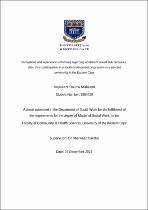Perceptions and experiences of females regarding adolescent sexual risk behaviour, after their participation in a youth development programme in a selected community in the Eastern Cape
Abstract
There is a high prevalence of sexual risk behaviour among adolescent females in South Africa. As such several intervention programmes are being offered by government, non-profit organisations and the private sector. The aim of this qualitative study was to understand adolescent females’ experiences and perceptions regarding adolescent sexual risk behaviour after their involvement in a youth development programme, offered by the Department of Social Development, in a selected community in the Eastern Cape, South Arica. As such a combination of an exploratory and descriptive design was employed, using a feminist approach to contextualise the phenomenon under investigation. Fifteen females between 18 and 25 years who participated in the YOLO programme participated in the study. Individual semi-structured interviews were conducted, and thematic data analysis yielded five themes and several subthemes. The findings indicate that adolescents engage in risky sexual behaviours from a very early age. The beneficial impact of the YOLO programme, its contribution towards improved decision making, reduced sexual risk behaviours and awareness of the influence of peer pressure are key findings. Recommendations for policy, social work practice and further research are offered. These include the need for research that addresses sexual risk behaviours in pre-adolescence. Improved insight into how to target sexual risk behaviours during pre-adolescence are regarded as a significant preventative measure. Moreover, government and policy makers should conduct more rigorous evaluations of youth development programmes focused on reducing risky sexual behaviour. Ethical clearance was granted by the Humanities and Social Sciences Research Ethics Committee, at the University of the Western Cape, and the Department of Social Development in the Eastern Cape.

